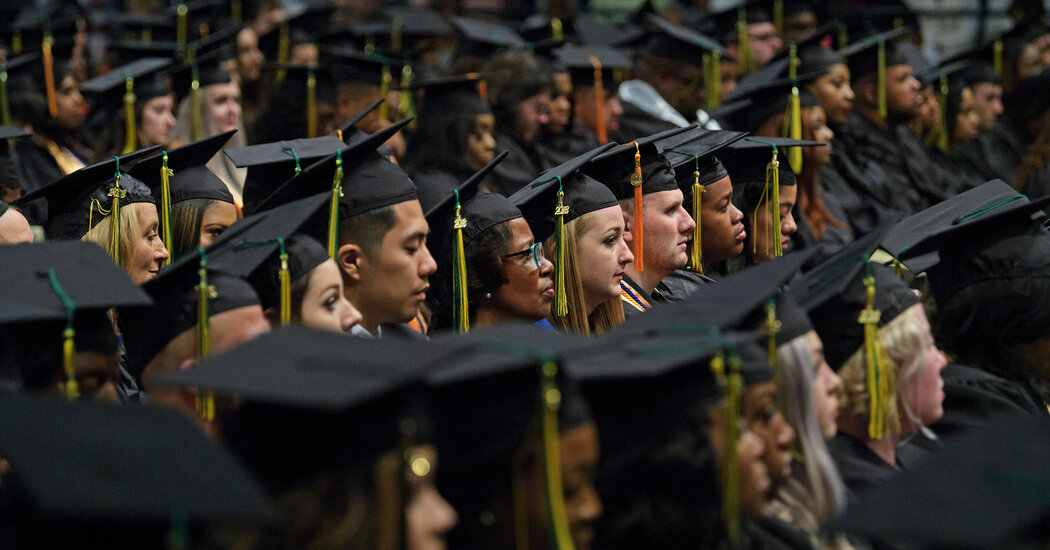Why Student Debt Relief Isn’t Elitist

Embarrassing admission: I have been watching the TV show “She-Hulk: Attorney at Law.” I’m not, in general, a fan of the superhero genre; but after “Orphan Black” I’ll watch anything starring Tatiana Maslany.
Anyway, one of the show’s plot points is that the title character is reluctant to reveal her superpowers. Why? Among other things, she’s worried (correctly, it turns out) that once people know what she can do she’ll have a hard time paying off her student loans.
I don’t think the writers were trying to make a political statement. They were just acknowledging the pervasiveness of student debt — and anxiety about student debt — in modern America. And that pervasiveness is why Republicans’ attacks on President Biden’s debt-relief policy — which they generally portray as a giveaway either to privileged elites or to lazy spendthrifts — are likely to fall flat.
Let’s talk about the numbers. The Biden administration says that its plan will provide relief to as many as 43 million Americans. That’s a lot of people, not a small, cosseted elite. In particular, data from the New York Fed say that more than 12 million Americans in their 30s — more than a quarter of that age group — still have unpaid student debt.
What this means is that even if you subscribe to the Trump diner theory of politics — according to which the only voters who matter are blue-collar guys wearing baseball caps — you should be aware that some of those guys probably took out loans to attend trade schools or community colleges, all too often getting nothing but debt in return. Even among those who didn’t take out student loans, many probably have children, siblings, cousins or friends who did. So the Biden plan will touch many people.
In short, student debt relief isn’t some kind of niche elite concern; it’s a broad, one might even say populist, issue. Initial polling on the Biden plan is somewhat mixed, with an Emerson College survey showing much stronger support than a CBS/YouGov survey. Even the latter survey, however, finds a majority of Americans approving of the plan; it even finds much less opposition among noncollege whites than you might have expected given that group’s general disapproval of all things Biden.
The other prong of the right-wing response involves invoking personal responsibility — in effect, portraying the recipients of debt relief as welfare queens. Republican efforts on that front have, however, been extraordinarily tone-deaf.
Just on general political principles, telling tens of millions of Americans that they’re lazy and irresponsible — that they’re all, as Ted Cruz put it, like a “slacker barista” who wasted years “studying completely useless things” — seems … not smart. To be brutally honest, that sort of caricature may have worked for Republicans when the insults were directed at urban Black people. But it’s likely to backfire when we’re talking about a broad spectrum of Americans who were just trying to move up in the world.
Furthermore, many of the most prominent critics of debt relief are almost comically out of touch, hypocritical, or both. Actually, scratch the “almost.”
For example, Marco Rubio has proudly declared that he paid off all his student debt — after being elected to the Senate and getting a book contract. Why can’t everyone do that?
On the hypocrisy front, the White House is having a field day mocking Republican members of Congress whose businesses received debt forgiveness under the Paycheck Protection Program. It’s true that debt relief for employers who maintained their work forces in the face of the Covid-19 pandemic was built into that program; it’s also true that later research suggests that only about a quarter of P.P.P. funds supported jobs that would otherwise have disappeared. The rest was, in effect, a giveaway to business owners.
More generally, it’s hard to take lectures on personal responsibility seriously when they come from a movement full of people — from Donald Trump, famous for stiffing his contractors, on down — who have long refused to pay money they owe. It’s hard to beat the spectacle of Stephen Moore, who Donald Trump tried to appoint to the Federal Reserve, calling people who don’t pay their debts “deadbeats”; after all, Moore’s nomination failed in part because it turned out that he had refused to pay his ex-wife $300,000 in child support and alimony.
Now, none of this means that the Biden plan should be exempt from criticism, although the vehemence with which some centrists have attacked it remains puzzling. Above all, the plan offers some one-time relief, but it doesn’t solve the underlying problem that led to all that student debt — which isn’t a proliferation of slacker baristas; it’s a society that demands educational credentials for many jobs without making education affordable.
The thing is, Biden tried to address this underlying problem; free community college was part of his original Build Back Better proposal. But he couldn’t get it through Congress. He is, however, offering some real help to millions of Americans — and Republicans clearly have no idea how to respond.
The Times is committed to publishing a diversity of letters to the editor. We’d like to hear what you think about this or any of our articles. Here are some tips. And here’s our email: [email protected].
Follow The New York Times Opinion section on Facebook, Twitter (@NYTopinion) and Instagram.
